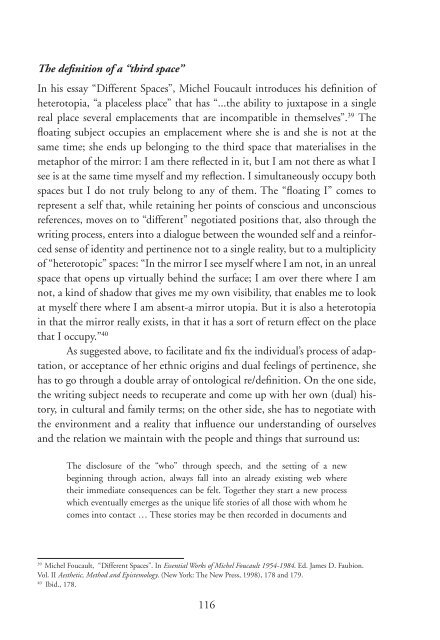Teaching Subjectivity. Travelling Selves for Feminist ... - MailChimp
Teaching Subjectivity. Travelling Selves for Feminist ... - MailChimp
Teaching Subjectivity. Travelling Selves for Feminist ... - MailChimp
You also want an ePaper? Increase the reach of your titles
YUMPU automatically turns print PDFs into web optimized ePapers that Google loves.
The definition of a “third space”<br />
In his essay “Different Spaces”, Michel Foucault introduces his definition of<br />
heterotopia, “a placeless place” that has “...the ability to juxtapose in a single<br />
real place several emplacements that are incompatible in themselves”. 39 The<br />
floating subject occupies an emplacement where she is and she is not at the<br />
same time; she ends up belonging to the third space that materialises in the<br />
metaphor of the mirror: I am there reflected in it, but I am not there as what I<br />
see is at the same time myself and my reflection. I simultaneously occupy both<br />
spaces but I do not truly belong to any of them. The “floating I” comes to<br />
represent a self that, while retaining her points of conscious and unconscious<br />
references, moves on to “different” negotiated positions that, also through the<br />
writing process, enters into a dialogue between the wounded self and a rein<strong>for</strong>ced<br />
sense of identity and pertinence not to a single reality, but to a multiplicity<br />
of “heterotopic” spaces: “In the mirror I see myself where I am not, in an unreal<br />
space that opens up virtually behind the surface; I am over there where I am<br />
not, a kind of shadow that gives me my own visibility, that enables me to look<br />
at myself there where I am absent-a mirror utopia. But it is also a heterotopia<br />
in that the mirror really exists, in that it has a sort of return effect on the place<br />
that I occupy.” 40<br />
As suggested above, to facilitate and fix the individual’s process of adaptation,<br />
or acceptance of her ethnic origins and dual feelings of pertinence, she<br />
has to go through a double array of ontological re/definition. On the one side,<br />
the writing subject needs to recuperate and come up with her own (dual) history,<br />
in cultural and family terms; on the other side, she has to negotiate with<br />
the environment and a reality that influence our understanding of ourselves<br />
and the relation we maintain with the people and things that surround us:<br />
The disclosure of the “who” through speech, and the setting of a new<br />
beginning through action, always fall into an already existing web where<br />
their immediate consequences can be felt. Together they start a new process<br />
which eventually emerges as the unique life stories of all those with whom he<br />
comes into contact … These stories may be then recorded in documents and<br />
39<br />
Michel Foucault, “Different Spaces”. In Essential Works of Michel Foucault 1954-1984. Ed. James D. Faubion.<br />
Vol. II Aesthetic, Method and Epistemology. (New York: The New Press, 1998), 178 and 179.<br />
40<br />
Ibid., 178.<br />
116

















